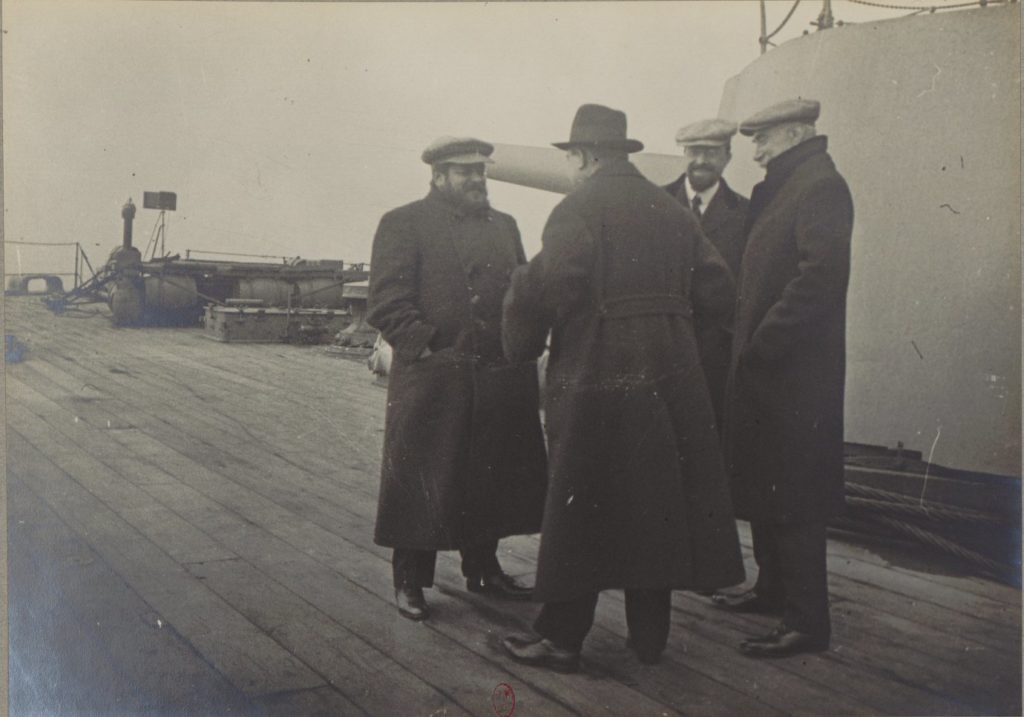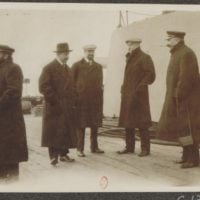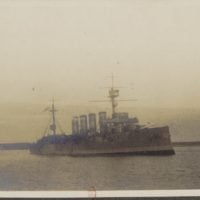
Related

On board of HMS Roxburgh, 1917 during World War I

HMS Roxburgh, 1917 - Norway. Public domain image

Orchestra on board of HMS Roxburgh, 1917

Albert Thomas on board of HMS Roxburgh, 1917

Albert Thomas travels to Russia on board of HMS Roxburgh, 1917

Socialist Albert Thomas on board of HMS Roxburgh, 1917

Albert Thomas on board of HMS Roxburgh, 1917

Socialist Albert Thomas travels to Russia on board of HMS Roxburgh, 1917

Nicholas II Declares War on Germany 1914
On board of HMS Roxburgh, 1917 during World War I
Summary
Socialist Albert Thomas travels to Russia on board of HMS Roxburgh, 1917. HMS Roxburgh was one of six Devonshire-class armoured cruisers built for the Royal Navy in the first decade of the 20th century. She was assigned to the 1st Cruiser Squadron of the Channel Fleet upon completion and was transferred to the reserve Third Fleet in 1909. She was then assigned to the 5th Cruiser Squadron of the reserve Second Fleet in 1912 and the 3rd Cruiser Squadron the following year. Upon mobilisation in mid-1914 her squadron was assigned to the Grand Fleet and spent much of its time patrolling the northern exits from the North Sea and the Norwegian coast. She was torpedoed in mid-1915 by a German submarine and repairs took almost a year. Roxburgh was transferred to the North America and West Indies Station in mid-1916 and spent the rest of the war escorting convoys.
Socialist Albert Thomas in 1905-1914 collaborated in the newspaper L'Humanité. During the First World War, Albert Thomas was war ardent supporter, standing on the social-chauvinist position. After the outbreak of the war, in October 1914 he was entrusted with organizing the production of ammunition. In May 1915 he was appointed deputy secretary of state for ammunition and military equipment of France, and in 1916 he took a specially created post of minister of armaments. After the February Revolution, he traveled to Russia, where he negotiated with the Provisional Government and the Petrograd Soviet, agitating against Russia's withdrawal from the First World War. In 1917, Albert Thomas came to Russia again with other representatives of the Second International, Henderson and Vandervelde, and traveled to Petrograd to exert pressure on the then Socialist-Revolutionary Menshevik Council towards the continuation of the war until the victorious end. "From France came the French Minister of Defense Supply Albert Thomas. He appeared with us to persuade the "valiant Russian people" to remain loyal to the allies and not to leave the war. This short-legged, red-bearded man in an elegant coat showed in his speeches an unsurpassed example of screaming and expressive gesture. Once he spoke from the balcony of the residence of the Commissar of the Provisional Government. Toma spoke French. It is unlikely that in the crowd listening to him, there were at least a dozen people who knew this language. The crowd consisted mainly of soldiers and residents of the Moscow suburbs. But in Tom's speech, everything was clear and without words. Toma, jumping on his bent legs across the balcony, clearly showed what would happen, in his opinion, with Russia if it came out of the war. He twirled his mustache in the manner of Wilhelm, made predatory eyes, jumped high and swiftly seized an imaginary Russia in the air by the throat. At the same time he let out a warlike scream and roared like a mad tiger. This terrible dance of Wilhelm over the defeated body of Russia lasted several minutes. The crowd, stricken with a circus show, held its breath. Paustovsky K.G. » Since 1919 - Chairman of the International Labor Organization in the League of Nations. He held this post until his death in 1932. Социалист Aльбер Тома в 1905—1914 сотрудничал в газете L’Humanité. В годы Первой мировой войны Тома был её ярым сторонником, занимая социал-шовинистические позиции. После начала войны ему в октябре 1914 было поручена организация производства боеприпасов. В мае 1915 он был назначен заместителем государственного секретаря по боеприпасам и военному снаряжению, а в 1916 занял специально созданную должность министра вооружений. После Февральской революции ездил в Россию, где вёл переговоры с Временным правительством и Петроградским советом, агитируя против выхода России из Первой мировой войны. В 1917 г. Альбер Тома вторично приезжал вместе с другими представителями II Интернационала, Гендерсоном и Вандервельде, в Петроград с целью оказать давление на тогдашний эсеро-меньшевистский Совет в сторону продолжения войны до победоносного конца. « Из Парижа приехал французский министр военного снабжения Альбер Тома. Он появился у нас, чтобы уговорить «доблестный русский народ» остаться верным союзникам и не выходить из войны. Этот коротконогий рыжебородый человек в изящном сюртуке показал в своих речах непревзойденный пример крика и выразительного жеста. Как-то он говорил с балкона резиденции комиссара Временного правительства. Тома говорил по-французски. Вряд ли в толпе, слушавшей его, был хоть десяток людей, знавших этот язык. Толпа состояла главным образом из солдат и жителей московских окраин. Но в речи Тома все было понятно и без слов. Тома, прыгая на согнутых ногах по балкону, наглядно показал, что произойдет, по его мнению, с Россией, если она выйдет из войны. Он подкрутил усы на манер Вильгельма, сделал хищные глаза, высоко подпрыгнул и стремительно схватил в воздухе за горло воображаемую Россию. При этом он испускал воинственные крики и рычал, как бешеный тигр. Эта страшная пляска Вильгельма над поверженным телом России длилась несколько минут. Толпа, пораженная цирковым зрелищем, затаила дыхание. Паустовский К. Г. » С 1919 года — председатель Международной организации труда при Лиге Наций. Занимал этот пост до своей смерти в 1932 году.
Nothing Found.
